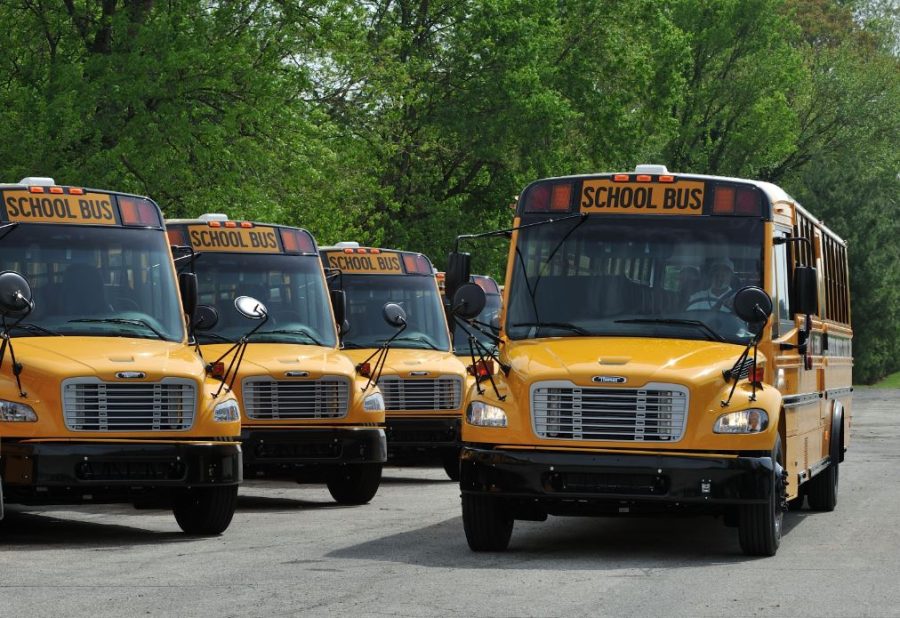OPINION: The Inconsistencies of the JCPS Start Times Plan
The JCPS Board of Education passed its new plan to alter school start times in March. Photo courtesy of JCPS
April 16, 2023
On March 28, the Jefferson County Board of Education passed its new plan to alter school start times across the district. Spearheaded by superintendent Marty Pollio, this plan will alter a majority of JCPS school schedules by pushing many elementary school start times earlier and moving some middle and high schools to a later start time beginning in the 2023-24 school year. The plan, dubbed Start Smart, may not appear to be problematic upon first glance. However, on closer inspection, the Start Smart initiative holds inconsistencies and requires alteration. While the new start times plan has potential, improvement is necessary in order to ensure that it serves all of JCPS.
Pollio has been inconsistent with his constituents about his reasoning for making the proposal. In order to foster support for his plan, the superintendent has changed his reasoning depending on his audience at the time, whether it be the Board of Education or the district at large. Prior to the reveal of the proposal on Feb. 14, Pollio argued that changes were in the works for the benefit of students’ mental wellness.
“When we have young people, adolescents, six through 12, starting school at 7:40, catching a bus at six in the morning, it is not healthy for students’ mental health,” said Pollio before unveiling the proposal. “The research is clear on it.”
In fact, Pollio is correct. According to the American Academy of Sleep Medicine, over 69 percent of high school students fail to meet the nightly recommended eight hours of sleep. However, this exigence quickly fell out of use. In the JCPS-published article “JCPS Unveils School Start Times Proposal,” JCPS claims that the initiative is “designed to help alleviate the problems caused by a shortage of bus drivers to get students to school on time.” The primary reason presented by Pollio for changing school start times shifted from improving student mental health to solving problems with limited bus drivers and bus route delays.
JCPS released a two-minute video on Feb. 15, in which Pollio defended his plan to change school start times. The video focused on the lack of bus drivers and bus route delays, without once mentioning student sleep or mental wellness. Instead, he drew attention to the fact that his proposal didn’t alter times significantly, which implies that the plan would not significantly benefit sleep schedules.
“Under this proposal, more than 80% of our schools will change our start times by one hour or less,” Pollio said in the video.
The proposal itself has inconsistencies as well. Despite claims to reduce bus routes, schools located near each other will have different bus times. While Manual would continue to use a 7:40 to 2:20 schedule, Noe Middle will change to an 8:40 to 3:20 schedule, necessitating an additional bus route.
“How does it help reduce bus routes if Noe and Manual are proposed to be an hour apart, despite being on the same campus and currently sharing bus routes?” I asked Pollio via a public text line at the Feb. 20 Virtual Community Information Session.
“One of the considerations we really looked at was to try to minimize the start times and the finish times for schools that are on the same campus to have better efficiencies when it comes to parent drop off,” Pollio said. “Anyone who has been near Manual, University of Louisville and Noe Middle School at 7 AM to 7:15 knows the backup that is created when it comes to schools starting and finishing at the same time. Having different start times will greatly reduce the backups traffic-wise and the traffic pattern that is occurring as a result.”
Pollio presented a line of reasoning that had not been introduced before: that of city traffic. According to his statements at this information session, the plan was tailored to account for traffic rather than student sleep schedules or even completely maximizing the reduction of bus routes. Pollio made no mention of reducing city traffic to make buses more efficient. Yet, this choice to separate nearby schools’ schedules does not make logical sense. For a family with students at both Noe and Manual, a bus would have to make two trips to their household, defeating the purpose of reducing routes.
For car riders going to multiple schools with different start times, there will be no way to drop students off without a waiting period, causing strain on families. According to the JCPS Start Smart website, “students may be dropped off approximately forty minutes before school starts.” Having differences of nearly an hour between many middle and high schools means that families could encounter a significant waiting period after dropping a student off at a 7:40 school. This awkward waiting period incurred by car riders could potentially push more students into taking the bus, which would only strain bus routes and bus capacities further.
At the Feb. 28 meeting of the JCPS School Board, Pollio switched back to student wellness as his primary rationale. He began the meeting with a Superintendent’s Report, in which he devoted several minutes to citing research studies that demonstrate the benefits of increased sleep time.
“[Increased sleep] obviously shows attendance increases, that tardiness decreases, academic achievement increases, increases both grades and state testing, mental and physical health improves, there is a decline in discipline issues as a result of this, and car crashes decrease from our student drivers,” Pollio said.
Yet, Pollio is clearly trying to have it both ways. By shifting his reasoning between busing and student wellness, he undermines trust in community members seeking to understand the true intention of the proposal.
Pollio is revealing this plan at a highly inconvenient time for JCPS families as well. The deadline for students to apply to schools was December, far before the proposal was made public, and as students received their acceptance letters, many found they would potentially be subject to different start times than they expected. Why wasn’t this plan developed and announced earlier so that start times could have factored into families’ school decisions? With the urgency that Pollio brought to this proposal by necessitating that it goes into effect next school year, families are now forced to reckon with arrangements that are potentially untenable for them, due to work schedules or other familial circumstances.
When a parent concerned by those issues brought them up at the Feb. 20 information session, Pollio provided a solution that displays indifference.
“Ideally, we tried to get the proposal out as quickly as we possibly could… We also want to accommodate families who have already made that selection,” said Pollio. “That is why we have the student transfer process that begins on May 1. So we would encourage families to seek to transfer if their school has a time that they just cannot meet.”
Pollio advises parents and students to simply switch schools if start times do not work with a family’s situation. However, this reveals a bias in the plan against magnet programs. Students choose magnet programs because the programs complement their interests and often put in great amounts of work to apply. Brushing off these students’ interests and advising them to switch schools if they can’t meet a start time undermines the hard work they put in to be accepted into their program.
It’s clear that the proposal has primarily selected magnet schools to remain at their previous start times, and Pollio even admits so himself at the Feb. 20 information session.
“I think it’s important to note: most of the schools that are choice schools, meaning selecting a magnet for middle and high schools, would start at the 7:40 time,” said Pollio. “Our resides schools, where we have the biggest impact on our attendance, would start at 8:40.”
Pollio admits that magnet schools were specially picked to remain at an early start time. This flies in the face of the earlier stated goal of increasing sleep. How is magnet students’ sleep worth any less than that of resides students? Singling out magnets makes it clear that Pollio wants magnet students to bear the sacrifice while the majority of the district sees a benefit.
The unfairness of the proposal is revealed with the amount of students who would not face a change. Nineteen schools will not alter their schedules under the Start Smart proposal; a majority of them are middle and high schools. According to JCPS Enrollment Data, over 15,000 middle and high school students will stick to their previous 7:40 to 2:20 schedules. If Pollio’s plan truly did mean to increase student sleep and mental wellness, this means that over one third of JCPS middle and high school students will be missing out on the benefits.
This is addressed in the Start Smart website’s Frequently Asked Questions section.
“If data shows teenagers require more sleep to perform better in school, why are some of the high schools and middle schools still starting at 7:40 a.m.?
Answer: Most middle and high schools have depots where students must change buses. We could not have all the schools with depot buses on the same start time so they were divided among two start times,” reads the website.
However, if the goal of the plan was to increase student wellness and the only obstacle was bus shortages, there is little stopping Pollio from changing middle and high schools to a later start time after the rest of the district, rather than before. Another concern is the lack of future plans to shift middle and high schools to a later start time in the future, when bus issues are alleviated.
Board member Linda Duncan brought up concerns of elementary students walking in the dark to their bus stops. Because elementary schools are now slated to begin at 7:40, and the elimination of bus routes now means students on average have to walk further to reach their bus stop, many elementary students would be expected to walk significant distances in the dark most mornings to catch their bus.
“I can’t imagine sending my child out to walk half a mile, or even a quarter mile, by himself in the dark to a bus stop,” Duncan said.
The district’s students, teachers, and staff deserve transparency about plans that will impact a majority of the community. It is Pollio’s obligation as the leader of the school district to be clear about the reasoning behind his proposal, and it implies irresponsibility or thoughtlessness when Pollio shares a different primary reason in every instance that he brings up the plan. If Pollio truly wants to improve the health of JCPS students, he would propose a plan that ensures all teenage students have more time to rest, rather than offering false hope to sleep-deprived students.
In addition, we as members of JCPS have a right to have our voices heard. If the proposal does not work for you, contact your local school board member or JCPS Chief Operating Officer Chris Perkins. Their email addresses are public and can be found at this link. In addition, JCPS is accepting feedback about their proposal at this link. With dedication, we can work to ensure that our district effectively serves as much of our population as it can.










Stephen Wyatt • Apr 24, 2023 at 2:30 pm
Great article that highlights the many issues with a flawed plan by JCPS! Lots of inconsistencies in why this is being proposed.
I would add, The families of ECE students have grave concerns about the proposed plan.
Hoping Manual Redeye will “lead the way” by launching a social media push to > Pause the Plan!
J • Apr 19, 2023 at 9:32 pm
Our board member spoke to our elementary school. This board member also forced the parents to listen to a 30 minute PowerPoint presentation on how JCPS spent money to hire analysts from MIT to research Louisville traffic patterns. JCPS hired MIT to make decisions for our kids.
The board member didn’t care. What parents can do is ensure these board members are never elected ever again.